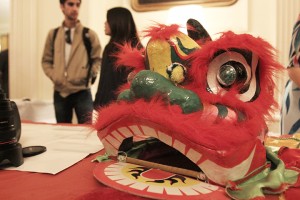
By Sanmai Gbandi
Reporter

David Li | Lariat Photographer
It is the longest celebration on the Chinese calendar, and is a big part of Chinese culture.
However, for Chinese students living on campus, celebrating the holiday for 15 days may be with classes, work and other responsibilities.
Evan Choi, a senior from Hong Kong, remembers how he celebrated when he lived in Hong Kong.
“When I’m at home, usually some families come visit us,” Choi said. “It’s just one or even more days of, like, talking and family gathering. You get to see people you haven’t seen for a while.”
When Choi celebrates here, he does something small with his friends and his church. He also tries to connect with his family.
“Baylor normally has one or two events,” Choi said. “I may just go with some friends. I may kind of celebrate it a little bit with some friends who are here. I always try to call my grandparents and Skype with my parents over Chinese New Year.”
The Asian Students Association throws a party with free food, live performances and traditional Chinese games in order to celebrate Chinese New Year.
This year, the event is at 7 p.m. Monday in the Barfield Drawing Room of the Bill Daniel Student Center. The event is open to everyone and is a way for a multicultural organization to spread more culture.
Senior Lai Jiang went to high school in Houston, but he was born in China. His family still lives there. He partook in some of the same traditions as Choi with his family in Hong Kong.
“At home, we sit around a big table and eat really good food, and get money in a small red envelope, and we also go to the temple,” Jiang said. “Here, I just go to a good Chinese restaurant and eat with my roommates.”
Holly Shi, a Chinese professor in the department of modern foreign languages, wants to educate her students about as much Chinese culture as possible.
“This year, I’m going to do something with my students on February 6th,” Shi said, “We call it Chinese Language Table. The theme is Chinese New Year, so we will be talking about Chinese New Year and the traditions, and also there will be food.”
This event is located in 100 Old Main. It is free and open to the public.
Shi said she tries to make sure her kids at home know about the traditions of Chinese culture.
“We usually do something, but usually it’s something simple because we still have to go to work and go to school,” Shi said. “We don’t do very complicated things, but we do something so my kids know it’s a special day.”
Chinese New Year at its core is about coming together with family and friends to appreciate one another. “Gung hay fat choy” which translates to “May you become prosperous” is a common saying in Cantonese that is said during the holiday.
Happiness, wealth and longevity are reoccurring themes.





